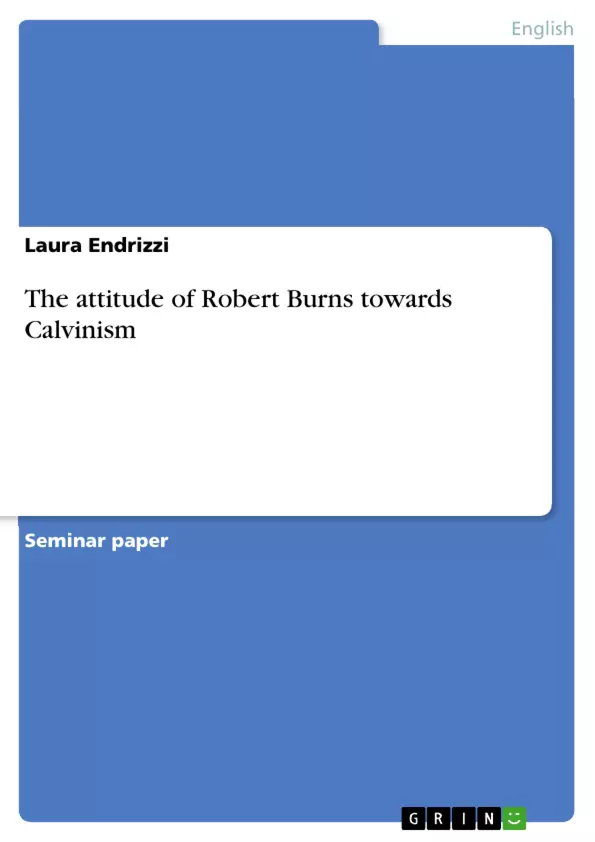Being the son of a farmer, Robert Burns was used to hard manial work from childhood on. But his father, William Burns, saw to it that his son got as good an education as
was possible under the circumstances. Despite his talent as a poet and his efforts as a farmer, Robert Burns stayed a poor man all his life. Allen Cunningham states, in the biographical
notes of the 1855 edition of the complete works of Robert Burns, that due to his being a poet Burns was never able to make a living out of his farm, as writing poetry did not agree with this kind of work. This stands to doubt, as writing poetry cannot bring on adverse weather conditions, or cause fields to be stony, pastures to be wet, and rents to rise. And Robert Burns
surely put a lot of effort in farming. He tried to be well informed by reading about new and better farming methods, and he enjoyed rural life, as can be seen in many of his poems and
songs, where he lovingly portraits the contryside and its inhabitants - humans as well as animals.
Robert Burns was an intelligent man with an independent mind, who had strong political and humanitarian opinions.
Inhaltsverzeichnis (Table of Contents)
- Introduction: Robert Burns
- Calvinism
- The Calvinistic Doctrine
- The importance of the Kirk in the 18th century
- The attitude of Robert Burns towards Calvinism
- The Kirk satires
- Conclusion - Robert Burns and his set of beliefs
Zielsetzung und Themenschwerpunkte (Objectives and Key Themes)
This paper examines the relationship between the renowned Scottish poet Robert Burns and Calvinism, exploring how his life and work were influenced by the dominant religious ideology of his time. It aims to shed light on Burns's attitudes towards Calvinism, as reflected in his poetry and his personal beliefs.
- The influence of Calvinism on Scottish society in the 18th century
- The role of the Kirk in shaping cultural and intellectual life
- Robert Burns's engagement with Calvinistic doctrine and its social implications
- The satirical critique of Calvinistic principles in Burns's poetry
- The significance of Burns's work in promoting Scottish language and culture
Zusammenfassung der Kapitel (Chapter Summaries)
- Introduction: Robert Burns: This chapter provides biographical information about Robert Burns, highlighting his humble beginnings as a tenant farmer's son and his early education. It also discusses his literary achievements and his commitment to Scottish culture.
- Calvinism: This chapter introduces the origins and key tenets of Calvinism, focusing on the influence of John Knox and the establishment of the Presbyterian Kirk in Scotland. It also examines the impact of Calvinism on education and social welfare.
- The Calvinistic Doctrine: This chapter delves into the core tenets of Calvinistic theology, explaining the five points of the T.U.L.I.P. acronym and their significance in shaping religious belief and practice. It also explores the criticisms and dissent that emerged within Calvinism.
- The importance of the Kirk in the 18th century: This chapter examines the role of the Kirk in 18th century Scotland, highlighting its influence on social, cultural, and political life. It discusses the Kirk's promotion of literacy and its engagement with education.
- The attitude of Robert Burns towards Calvinism: This chapter explores Robert Burns's complex relationship with Calvinism, analyzing his personal views and how they were reflected in his poetry. It discusses his critique of Calvinistic doctrines and his advocacy for individual freedom.
- The Kirk satires: This chapter examines the satirical nature of some of Burns's poetry, focusing on his criticisms of the Kirk and its influence on Scottish society. It analyzes the language and themes of his satirical works.
Schlüsselwörter (Keywords)
The text explores themes related to Scottish poetry, Robert Burns, Calvinism, the Presbyterian Kirk, social and cultural influence, religious doctrine, satirical critique, and Scottish language and identity. It also examines the impact of Calvinism on education and social welfare, highlighting the importance of literacy and the role of the Kirk in shaping Scottish society.
Frequently Asked Questions
What was Robert Burns's attitude towards Calvinism?
Burns had a complex and often critical relationship with Calvinism, frequently using satire to challenge its strict doctrines and social influence.
How did the Presbyterian Kirk influence 18th-century Scotland?
The Kirk held significant power over social, cultural, and political life, promoting literacy and education while enforcing strict moral codes.
What are the "Kirk satires" in Burns's poetry?
These are poems where Burns critiques the hypocrisy and rigid principles of the church establishment using humor and the Scottish language.
What role did Burns's background as a farmer play?
Coming from a humble farming background, Burns maintained an independent mind and humanitarian opinions despite a life of financial struggle.
Why is Robert Burns important for Scottish culture?
His work was instrumental in promoting the Scottish language and identity, celebrating rural life and the dignity of the common man.
- Quote paper
- Laura Endrizzi (Author), 2011, The attitude of Robert Burns towards Calvinism, Munich, GRIN Verlag, https://www.grin.com/document/296256



